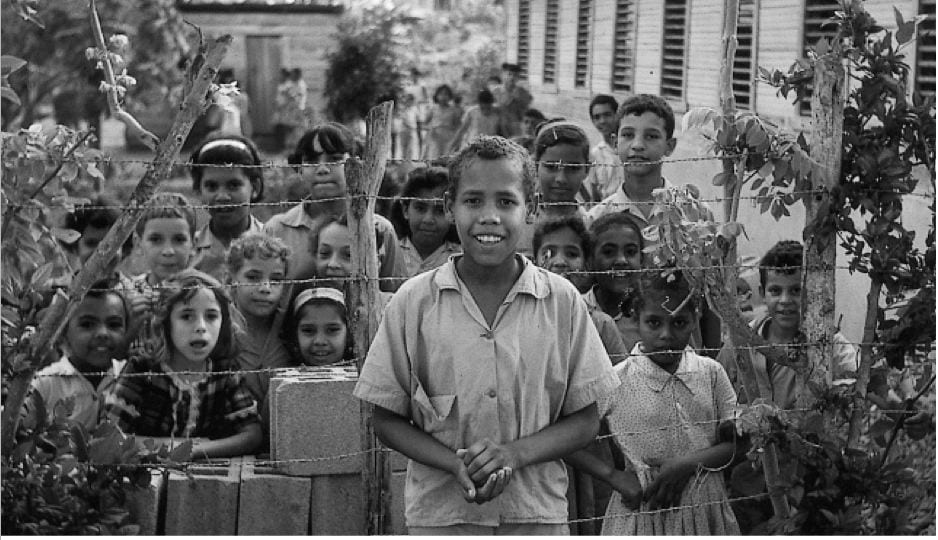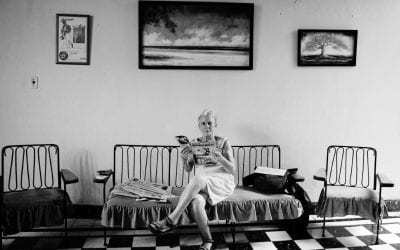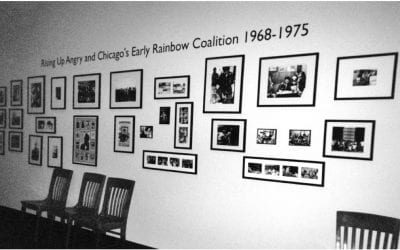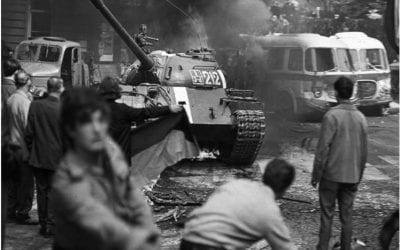Under the Bridge
And Down from the Hills

For the first time in her life, Merilee Grindle encountered deep and chronic poverty, as well as the realities of poor education and health care. Here is a scene from her volunteer experience. Photo by Merilee Grindle
I remember clearly the thirty seconds when I grew up. As we crossed the bridge over the river on the way from the airport, I looked down onto a multitude of shacks climbing crazily up the steep slopes of the sludgy riverbank. An awful truth was suddenly clear: in two years’ time, when I made the reverse trip on my way to the airport and home, I would look down on those same shacks climbing up the riverbank. Nothing I would do in the intervening years would have any real impact on the reality that was the Dominican Republic.
All those many years ago I had just graduated from Wellesley College, an idealist and a gringa who wanted to do good by joining the Peace Corps. In that brief journey across the river, I grew up in the ways of the world. For the first time in my life, I encountered deep and chronic poverty; I came face to face with inequity and powerlessness; I saw the realities of poor education and worse health care; I discovered the meaning of marginality; I understood the legacy of colonialism.
A second growing-up moment haunts me from those years. A mother walked down from the hills, where she lived in a remote village with her two young daughters. She asked me to take their picture; she knew her children were going to die soon and wanted something to remember them by. I thought she was probably right; the girls were stick-thin, wan, and listless. The snapshot remains crystal clear in my mind.
I lived first in a small city and then in a village, and I found the lack of running water, electricity, and privacy relatively easy. Much more difficult was coming to terms with the gap that separated my comfortable life at home from the lives of those born into poverty in a poor country. I found that my education had not prepared me for acting effectively in the world and that I was not very good even at those few activities I did undertake. Nor could my assignment in mother-child health in any way compensate for the damage done by poverty and powerlessness. More profoundly, I was confronted with the history of the relationship between my country and this one. I was, after all, a volunteer in a country that had, two years earlier, witnessed the invasion of 42,000 U.S. Marines. One of its 19th century presidents tried to annex the country to the United States. Marines occupied it between 1916 and 1924. At 2 a.m. one morning, a drunken man in the house next door ranted that that he had a gun and he was going to shoot the gringos.
Of course, there are other memories—a countryside blessed with vibrant green beauty, kind and generous people, times when differences melded into shared enjoyment of a moment. There were the experiences of living on rice, yucca, beans, andplátanos; dancing the merengue; hearing Mass across the barrio at 5 o’clock every morning on multiple radios turned up loud; collecting tales of sánganos jumping out onto dark, lonely rural roads, ready to suck a victim’s blood. And there was what we shared as volunteers—common anxieties, trials, tribulations, small victories, and escapes to the big city for weekends of beer and Chinese food.
It was not an easy two years, but they were important ones: years when I was forced to abandon belief in facile solutions and the ease with which good could be accomplished. Poverty, I discovered, was structural, it was pervasive, and it was deeply bound up with inequalities in power and access to basic rights. The poverty of people and countries, I saw, could not be divorced from the relations among countries, particularly poor with rich ones.
Eventually, these issues drove me to graduate school. Yet today, I continue to see the view from the bridge and remember the mother who came down from the hills with her two sickly children. I haven’t yet discovered solutions to the conundrums they raised for me. Yet I do believe it important that we know more about how they happened and that we pass along our concerns to others who, we hope, will be better prepared to make a difference than I was when I was 22.
Winter 2009, Volume VIII, Number 2
Related Articles
Remembering the Power of One: A 1960s Economic Perspective
In a region with an unfortunate knack for being ignored, forgotten and subverted by world powers, we take another look at the 1960s and from snapshots we offer hope as the first decade of the new millennium draws to a close. We take a look through the lens of Raul Prebisch, former director of the Economic Commission for Latin America (ECLA) and subsequently founding Secretary General of the United Nations Conference on …
Sisters, Brothers, Young Lords: A Common Cause: 40 Years of Struggle and Remembrance
I had forgotten how young, defiant and determined we were. We saw ourselves as instruments of change, students of revolution. What we lacked in terms of experience, we made up for with enthusiasm and commitment. Viewing photographs from forty years past, we milled through the exhibit, scrutinizing photos, graying militants remembering, owning our pasts. Like many of those present at the gathering, I had carved …
Degeneration of the Sixties: A Look at Spain
I heard the expression “the sixties” for the first time in secondary school when my language teacher wrote the number 68 on the blackboard to illustrate his lesson on the difference between the verbs denote and connote. The first meant just that: to mean objectively; connote, on the other hand, involved not only the specific meaning of a word, but another meaning of the appellative or expressive type. Thus, my teacher …




